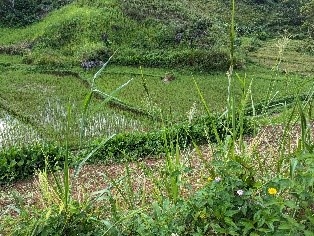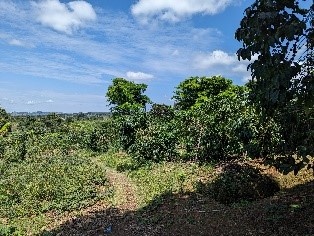
The team is working together with partners to collect household panel data, which means they are repeatedly visiting the same households within a specified time-frame. All surveys were designed to capture the livelihoods, production systems, perception of climate change, and adaptation behavior of agricultural households, amongst others. Repeated survey interviews allow to focus on changes that happen over time, which is particularly important for the study of climate impacts and adaptation.
Food and nutrition security in Madagascar
The AAS team in collaboration with the Climate Change and Health group (CCH) started their primary data collection efforts in Madagascar as part of the Agrica Madagascar project. 624 farming households in the southern regions of Atsimo-Atsinanana, Anosy, and Androy are interviewed 9 times over the course of one year – twice in person and 7 times via phone. This high-frequency format will allow the researchers to study the seasonality of weather impacts, food insecurity, and adaptive behavior, which can aid in identifying seasonally adapted solutions. The data collection is implemented by the Malagasy research company CAETIC Développement.

Rice fields near Ranomafana, Madagascar
Agroforestry in Tanzania
As part of the SCARF project, AAS collected baseline data from farmers in central Tanzania, in the Dodoma and Morogoro regions. The survey accompanies the SCARF project, which aims to identify and further develop targeted agroforestry solutions for smallholder farmers in Tanzania that can be scaled over time and space. In July 2024, there will be a large-scale follow-up survey with 1200 farmers to evaluate the impact of the agroforestry intervention. The project and survey are implemented together with ICRAF Tanzania, the NGO Sustainable Agriculture Tanzania (SAT), and Ardhi University in Dar es Salaam.
Coffee value chains in Uganda
In order to quantify losses and damages along the different steps of the coffee value chains and to identify and assess innovative adaptation strategies for different value chain actors, the AAS Team is collecting survey data of a representative sample of 750 coffee farming households and 150 coffee processing businesses in Central, Western and Eastern Uganda as part of the AfriValue project. The first of three waves was collected in partnership with the French agricultural research centre for international development (CIRAD) and the Uganda Coffee Farmers Alliance (UCFA).

Coffee fields near Mityana, Uganda
Sustainable land management in Ghana
Finally, the largest of the four surveys is carried out as part of the DecLaRe project in Northern Ghana: almost 3000 households will be interviewed for the first time in autumn 2023 and in autumn 2024 for the second wave. The sample is representative for the whole of Northern Ghana. The questionnaire covers topics ranging from agricultural production, livestock, land tenure, insurance, and climate adaptation in great detail. The data will be used to study different policy-relevant questions linked to climate change adaptation and to devise sustainable land management pathways as part of the DecLaRe project. Partners include the Leibniz Institute for Economic Research (RWI), University of Development Studies in Ghana, West African Science Service Centre on Climate Change and Adapted Land Use (WASCAL), and Ghana Statistical Service.





